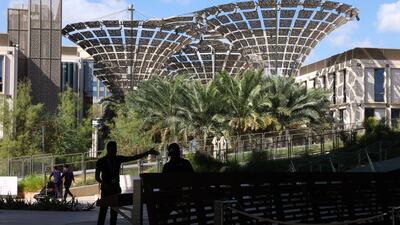The UAE is hosting the world’s biggest opportunity to make meaningful progress on climate change: the 2023 UN Climate Change Conference, Cop28. And for the first time in the history of the conference, mayors and governors will have a formal role in the proceedings.
That change reflects a growing awareness among national and international leaders of the critical role that cities play in driving down emissions and building climate resilience – and Dubai is a leading example of both.
Consider that earlier this year, the UAE witnessed a surge in temperature, topping 50°C. The likelihood of continued extreme heat means that Dubai has had to become a pioneer in climate change innovation. Today Dubai is a city-sized laboratory, working to create conditions where humans can not only live, but thrive.
Right in the heart of our city, the Dubai World Trade Centre has become a model for how to combine different climate and resilience measures – from extensive solar panelling to lower energy consumption, to revolutionary waste management.
Dubai is also running conservation and sustainability initiatives across its tourism ecosystem, and it has increased water usage efficiency and developed clean energy alternatives through its Carbon Abatement Strategy. In 2021 alone, the city reduced carbon emissions by more than 20 per cent, preventing millions of tonnes of carbon from polluting our atmosphere.
Dubai has also set targets to reduce the emissions of greenhouse gases by 50 per cent in 2030 and to achieve net-zero by 2050. The city will reduce emissions in power and water, road transportation, manufacturing and the waste sector to achieve its goals.
While Dubai has made great strides, the UAE federal government has accelerated its ambitions. In July, it raised its national emissions targets, planning to curb carbon emissions by 40 per cent by 2030. In the months ahead, the UAE will update its climate action plan based on the strategies and insights that emerge at Cop28.
Dubai is also home to Emirates Airlines, the largest carrier in the Middle East, which is also taking action to be more sustainable. Emirates recently conducted the first ever test flight of an Airbus A380 powered by 100 per cent Sustainable Aviation Fuel. Sustainable fuel, electric aviation and hydrogen-powered aviation are all being explored in Dubai and the UAE as pathways to decarbonising aviation.
To achieve the next round of climate targets, Dubai has already begun diversifying its energy sources. While the city’s history is closely tied to fossil fuels, it is building a new future by harnessing its most abundant natural resources: sunlight.
For a sense of what’s on the horizon, leaders attending Cop28 should consider visiting the Mohammed bin Rashid Al Maktoum Solar Park – among the world’s largest single-site solar parks. In June of this year, the solar park launched its fifth phase, with plans to add another 2.2 million photovoltaic panels that will produce as much as 900 megawatts of energy. And this is only the beginning. Once complete, the facility is expected to eliminate more than 6 million tonnes of carbon emissions every year.
This scaled foray into solar power has enabled other exciting energy innovations, too. For instance, Dubai has partnered with Siemens Energy to build the Middle East’s first hydrogen plant driven by renewables, a potentially game-changing development in the global energy sector. Industry leaders are hopeful that the UAE may eventually produce enough green hydrogen to export it to other nations.
This is more than a technological marvel. It can be a model for how businesses and local governments can work together on projects that are incredibly ambitious towards our global fight against climate change.
We recognise, of course, that many cities simply do not have the capacity (or weather) to scale state-of-the-art solar facilities. But the perceived limitations of any city – be it a dependence on cars, air-conditioning, or energy-intensive industries – does not disqualify anyone from climate action. If Dubai can begin transforming itself into a champion for solar energy, then cities worldwide should be just as bold in charting a more sustainable future.
To win the battle against climate change, it’s going to take leaders at every level working closer together than ever before. At the UN climate conference, with Dubai taking centre stage, cities have a historic opportunity to help lead the way.











